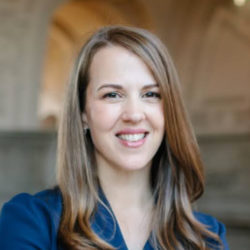Major Fellowship Activities: Johnson worked with Libby Turpen on the Cooperative Threat Reduction (CTR) project where she is contributing research for the Pathogens for Peace Initiative to convert former bioweapons facilities in the former Soviet Union to vaccine production facilities for the developing world. She did background research on International Science and Technology Center projects in Russia that relate to vaccine and drug development, on the most pressing medical needs in the developing world, and on the private pharmaceutical industry in Russia. She also researched potential international donors that may be interested in underwriting a Canadian bio-redirect project. She developed background reports about the activities of agencies and NGOs involved in vaccine procurement for developing countries, which will be added to the CTR website. She interviewed companies across the U.S. that are involved in cooperative projects with Russian scientists and compiling CTR “success stories” that will be posted on the website. She organized and developed briefing materials for Roundtable Meetings focused on specific impediments to cooperative threat reduction programs run by DOE and DOD. To date they have held meetings with U.S. Industry Coalition (USIC) members, U.S. Department of State officials, Civilian Research and Development Foundation (CRDF) members, and subcontractors of the Cooperative Threat Reduction Integrating Contracts (CTRIC). She has compiled summaries of some of the roundtable meetings which will eventually be used for a comprehensive report on impediments to cooperative threat reduction from the perspective of the private sector.
She also worked with Peter Roman on a sustainable biodefense project and wrote an essay on “The Need for a Sustainable Biodefense Strategy” that addresses the lack of sustainability and long-term outlooks in the present deterrence, preparedness, mitigation, response and recovery plans for biological weapons attacks and emerging diseases. She directed an invitational brown bag luncheon seminar series for young professionals in biosecurity, which took place weekly beginning on July 20th. The participants are a small group of invited young professionals, who have 2-5 years full-time work experience in the fields of public health preparedness, bio-nonproliferation, biotechnology or biodefense research. The participants represent the Department of Health and Human Services (HHS), The National Association of County and City Health Officials, The Federation of American Scientists, The Department of Defense, The National Institutes of Health, The Association of State and Territorial Health Officials, The American Public Health Association, The National Academies of Science, The Heritage Foundation and the Henry L. Stimson Center. The first scheduled speakers include Jonathan Tucker of the Center for Nonproliferation Studies, Elin Gursky of ANSER, Bruce Gellin of HHS, and Mark Smolinski of the Nonproliferation Threat Initiative. There were seven luncheons from July 20th through August 31st.
She attended several conferences and meetings of interest to the CTR project: “Russia’s Loose Nukes” at Georgetown University; “Making Markets for Vaccines: From Ideas to Action” at the Center for Global Development; “Strengthening the Nonproliferation Regime: Challenges and Prospects for Global Security.’ on Capitol Hill,” “Monitoring Nuclear Weapons and Nuclear-Explosive Materials: An Assessment of Methods and Capabilities” at the National Academy of Sciences; “BioShield II: Biosecurity, Public Health and the Role of Industry” at the Center for American Progress.
Current Activities: Johnson is Founder and Director of ProFellow and the International Fellows Network, a 1,000+ member organization of current and former fellows globally. ProFellow is the world’s leading online resource for information on professional and academic fellowships that works with foundations, universities, companies, NGOs, government offices and advertising agencies seeking to recruit leaders for fellowships, grants, awards, graduate and doctoral programs, leadership and professional development programs, international exchange, conferences and other unique opportunities. In late 2020, ProFellow published the latest Fellowship Industry Report in collaboration with IREX. This report shares demographics of social impact fellowships, as well as programs’ efforts to evaluate their impact and increased diversity, equity and inclusion in recruitment and programming.
She earned a PhD in Emergency Management from Massey University in New Zealand in 2014 where she studied the impact of disaster preparedness education for children, and received the Dean’s Award for Exceptional Theses. Before her PhD candidacy, she was an Ian Axford Fellow in Public Policy, hosted by the New Zealand Ministry of Civil Defence and Emergency Management, and also worked in the National Crisis Management Centre during the response to the February 2011 earthquake in Christchurch, New Zealand. Before this, Johnson served as Policy Director of the National Commission on Children and Disasters, a two-year Commission created by Congress. She directed the Commission’s research agenda for a large-scale policy study examining children’s needs as they relate to preparation for, response to, and recovery from major disasters and emergencies. Johnson was also a German Chancellor Fellow from 2003-4 in Berlin, Germany and a New York City Urban Fellow from 2001-2. She earned her MSc in Public Health from the London School of Hygiene and Tropical Medicine and her BA in Government from Cornell University. She now lives with her husband Ryan and two children in Bend, OR.

